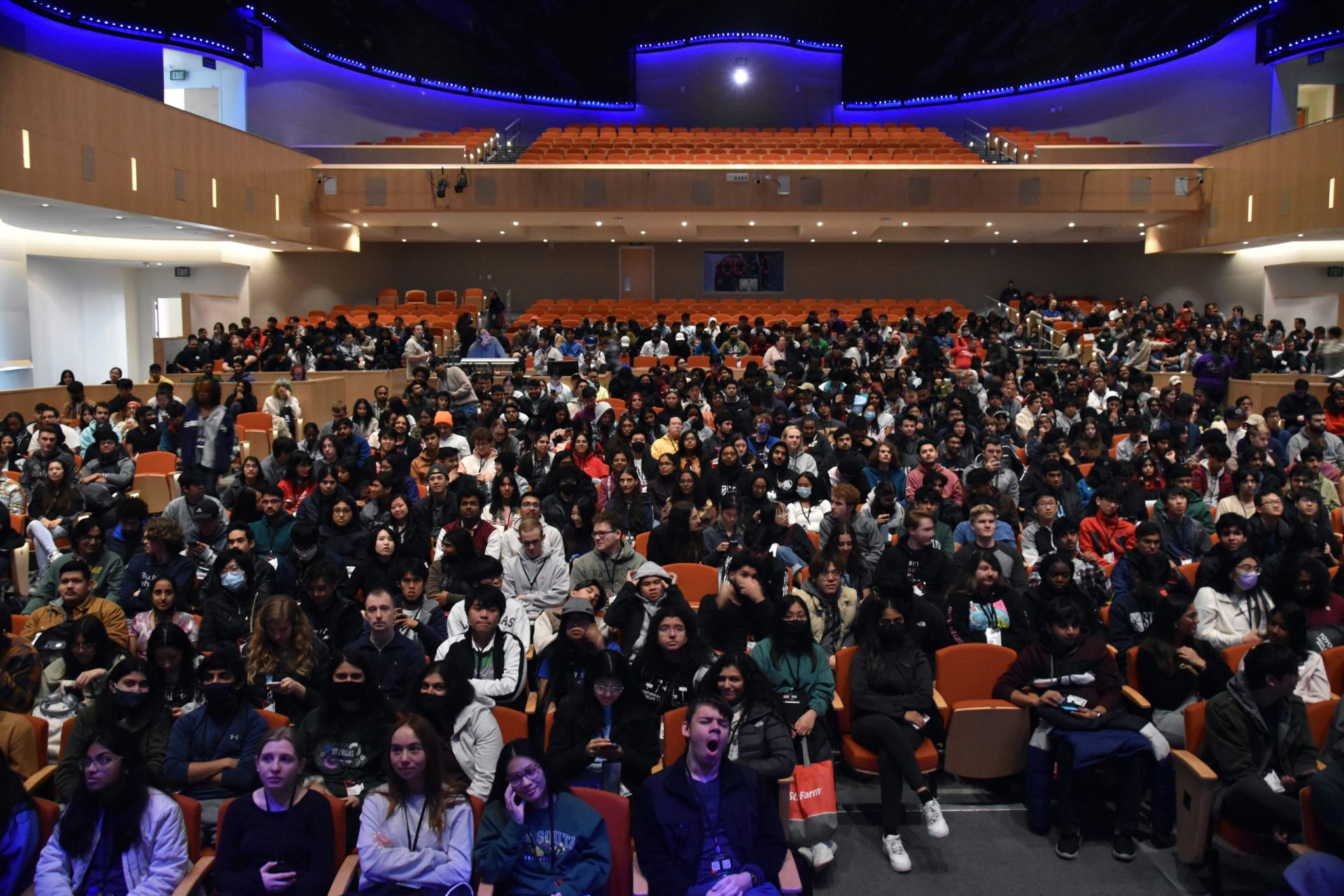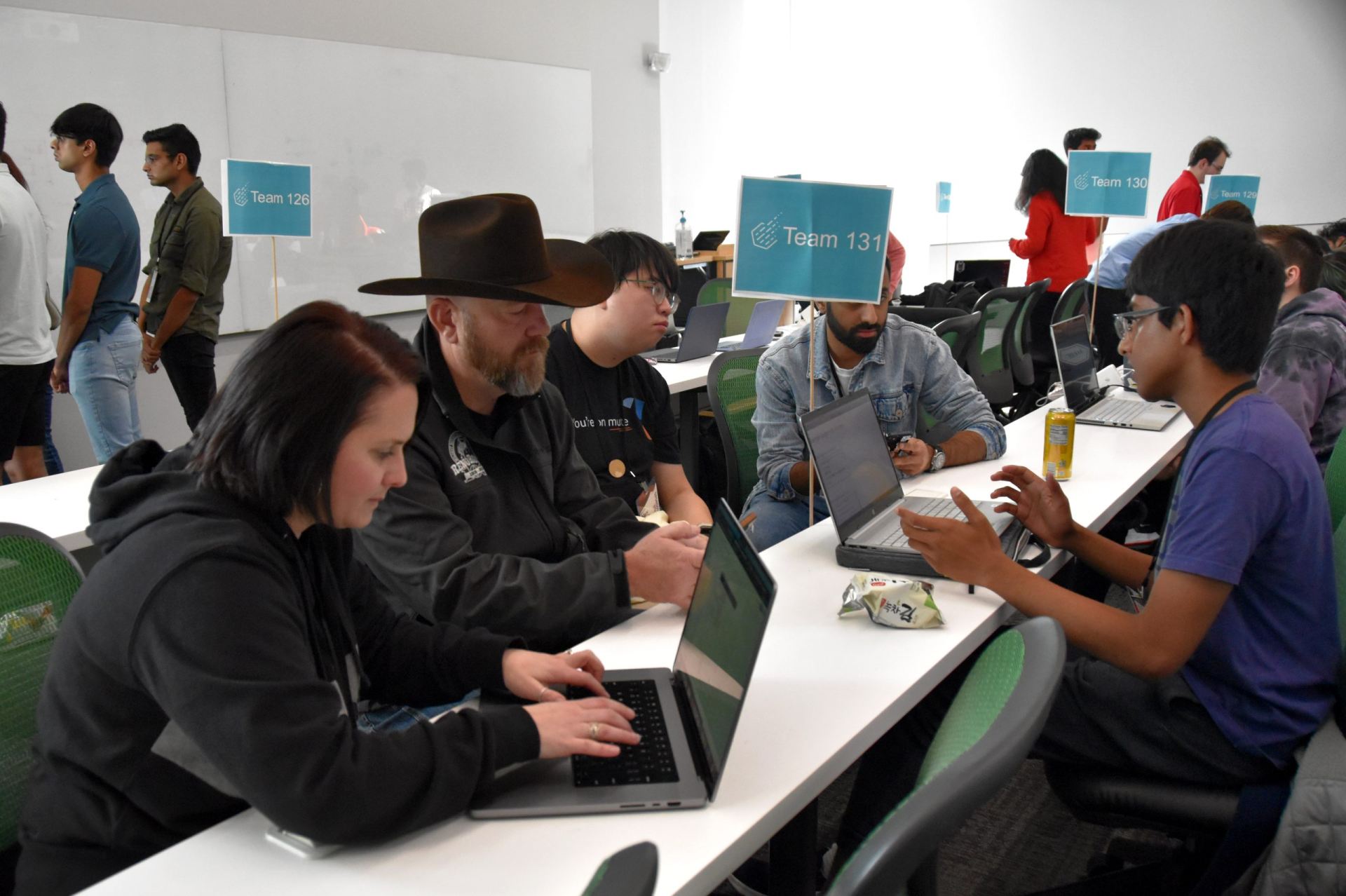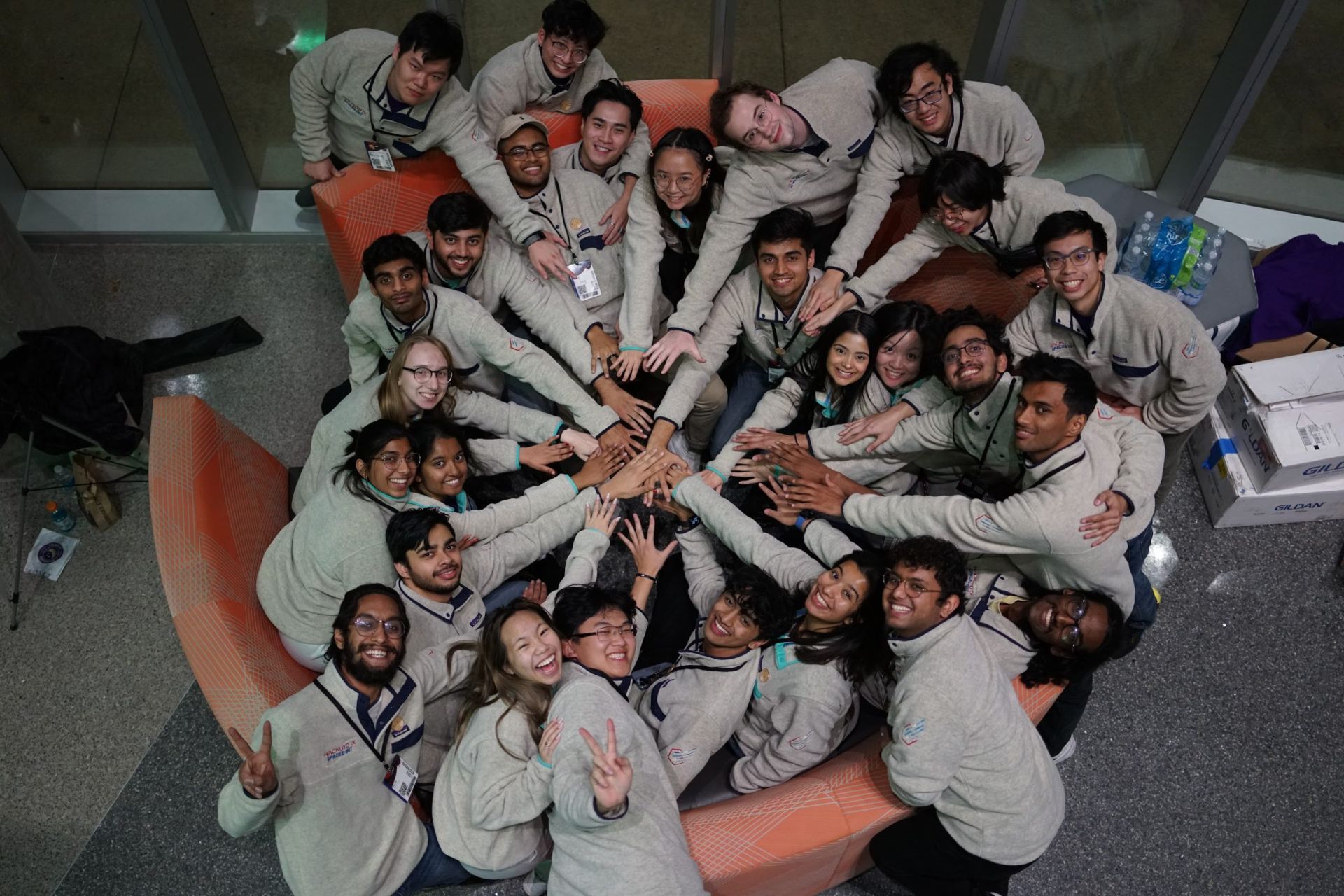HackUTD Hosts its Largest Hackathon
A hackathon is a hub for out-of-the-box thinking that fosters divergent creativity, ranging from extending the reach of existing solutions to discovering all-new solutions. People may see different problems or see the same problem from different angles, and when put together in teams, they collectively pool their roles and skill sets to envision distinct approaches and solutions.
The University of Texas at Dallas Department of Computer Science and the UT Dallas Chapter of the Association for Computing Machinery (ACM) hosted the largest hackathon in Texas for its ninth iteration this past fall. HackUTD encourages students to use their imagination and knowledge of computer science to change the lives of real people by producing solutions that solve real-world problems. HackUTD saw the highest number of hackers in its seven-year history, with over 1,000 in-person participating students from all over the United States arriving to participate in the 24-hour challenge. HackUTD IX also had the largest number of final projects to date, with approximately 200 projects submitted for judging. HackUTD is now the biggest hackathon not only in Texas but also in the entire Central Time zone and the second largest hackathon in the Southern United States.
For 24 hours, HackUTD grants participants the freedom to learn new concepts, work with friends, step outside their comfort zones and showcase their skills. Hackathons utilize intense brainstorming events for multiple purposes, from increasing student engagement to imparting a hackathon culture and everything in between. Hackathons provide attendees with a safe environment that allows failure without consequences. The events encourage experimentation, allowing for more freedom to try alternative approaches and tools.
As one of the major collegiate hackathons, HackUTD has become the most prominent university hackathons in North Texas.Each year, HackUTD is sponsored by many industry sponsors such as Toyota, State Farm, EOG Resources, Goldman Sachs, Texas Instruments, Axxess, CBRE, Ring Central, Capital One, L3Harris, Sticker Mule, and Stand Out Stickers. Each sponsor provides their own challenge and prizes for the winners of their challenges. Toyota challenged students to build a solution to improve the end-to-end vehicle experience. Major League Hacking challenged students to find the best use of Google Cloud and best use of Auth0. Students were able to compete in various tracks, including mobile, design, and hardware.
State Farm challenged students to use technology to design a creative solution to a problem commonly faced by their community. EOGResources challenged students to work together to try and tackle problems and find many other potential ways to analyze data to build an application, whether it was a web app, mobile app or pure analysis tool to help better understand their drilling data in order to improve asteroid mining speed, cost and efficiency to infinity and beyond. Goldman Sachs asked students to create a tool specifically for U.S. investors, which takes macroeconomic factors into consideration. Meanwhile, CBRE challenged students to develop a prototype to demonstrate how to improve customer experience (CX) by adopting artificial intelligence (AI) and machine learning models based on review comments from social media, contact centers, and feedback surveys with the goal of enhancing customer satisfaction and increasing loyalty.
HackUTD attendees were offered the option to join various industry-led workshops involving tech talks hosted by the event sponsors in order to gain insight into the role of technology within their industry. Events included a Toyota Workshop that focused on the social good product demonstration of the cabin awareness concept, a Goldman Sachs workshop focused on digital banking platforms at scale, an EOG Resources workshop focused on making sense of big data and State Farm’s workshop focused on serverless RESTful APIs in Amazon Web Services (AWS). In addition to industry-led technical workshops, non-coding activities also were offered to help students unwind and relax.
HackUTD organizers went above and beyond to focus on a top quality hacker experience. Running an event for over 900 participants was no easy undertaking, but the HackUTD leadership team again took on the challenge. Organizers took the digital landscape and made the absolute best of it. Attendees were amazed by the ideas organizers implemented. HackUTD IX was organized under the guidance of UT Dallas CS Professor John Cole, who serves as the ACM faculty sponsor.
“Working on HackUTD with my team of 35 officers has been a great experience for me and everyone involved,” said Vishvak Bandi, director of HackUTD IX. “Our team works from the start of the year to deliver an excellent hackathon experience. Without our team members, none of this would be possible. We were blown away by the reception to the event and especially by the large out-of-state participation we had. HackUTD IX was able to break several records for the university and organization’s history, and the officer team is proud to continue that tradition.”
Once the hackathon officially started, attendees worked furiously on their projects. Throughout the 24 hours, attendees learned how to work with new technologies, throw together tons of code and hopefully finish what they had set out to build. Hackathons are a great vehicle for ensuring that every team member is involved or invited to participate, and in the process learning to build a more inclusive community. Being inventive together provides an opportunity to form and reinforce the bonds between team members, possibly even more because they are working in an unfamiliar and challenging environment.
Many of the students stayed awake for the full 24-hours in order to finish their projects by noon on Sunday. Despite the lack of sleep, teams submitted their final projects on time. They subsequently spent four hours showcasing their ideas to a judging committee consisting of tech industry members, sponsor representatives and UT Dallas faculty. HackUTD IX had its most significant number of final submissions in the history of the competition, with over 200 projects. Teams were judged on categories including uniqueness, technicality, viability, UI & UX design, complexity, usefulness and impact. Winning teams in each challenge were awarded prizes. There were also prizes from each of the company sponsors. In total, this year’s prizes were valued at over $30,000. Click here to view all the projects from HackUTD IX.
The following are brief descriptions of first, second, and third-place winning projects as well as winners of sponsor challenges at HackUTD IX:
HackUTD 1st Place – Sk.edge
Sk.edge creators thought about how students often look through professor ratings and grade distributions to get the best possible experience during their future semesters. There are numerous excellent resources–however, they have scattered around and are often difficult to consider all at once. Sk.edge takes these great resources, puts them in a single browser extension, and integrates them into the school’s registration site when browsing through your courses and sections (so far, only UTD). Sk.edge used the RateMyProfessor API and the Nebula Labs API to acquire professor and grade data. Our front end for the extension was made in Javascript and used Bootstrap, while the back end used Python to provide the RMP data.
Team members include Adam Szumski, Alexis Kaufman, and Brad Johnson.
HackUTD 2nd Place – Driver Advisor
The Driver Advisor creators thought about how a large population in the U.S. needs some sort of assistance to understand the road conditions that are presented in front of them when they are driving. This includes older adults and new immigrants to the country who may not fully understand the road conditions yet. The Driver Advisor app strives to tackle these issues while making the road safer for everyone. Drive Advisor specializes in recognizing road signs that are presented using our very meticulously trained CoreML model. Once identified, the application will speak in the driver’s preferred language to tell them about the upcoming detected road sign. The application simultaneously uses the front camera to detect drowsiness and will notify the user in their own language to wake up.
Team members include Shoaib Huq, Khang Nguyen, Jake Spann, and Nhi Le.
HackUTD 3rd Place – Horizon
Horizon analyzes an investor’s stock portfolio, savings, and treasury bond portfolio to determine the portfolio’s overall risk for the following year. Then, it allows the investor to pick a risk level that they are comfortable with and recommends how the investor should allocate their capital between stocks, bonds, and savings to maximize their annual expected return for their chosen level of risk. Horizon’s recommendations are based on the influence of critical macroeconomic factors in the United States: the stock market, treasury bonds, inflation, and sector performance.
In essence, Horizon is meant to optimize a portfolio of assets so that investors feel comfortable with the level of risk they are taking on while getting the highest expected return possible.
Team members include Raaj Patel, Anthony Abubakar, Andrew Melbourne, and Nate Stelling.
Below is a list of all sponsor-related challenges, as well as the different track winners.
HackUTD Tracks
- HackUTD Hardware Track – Achy Breaky Heart – Laura Barnes, Aditya Das, Elijah Moya, Alfred Vincent Vergel of God
- HackUTD Beginner Track – Steller – Jaszmine DeFranco, Bradley Mixon, Shannon Carter
- HackUTD Design Track – Bankwise – Abhishek Madhavan, Abel Thomas, Manasi Vipat, Shaz Kumar
Toyota Challenge
- Toyota 1st – Drive Advisor – Shoaib Huq , Khang Nguyen, Jake Spann, Nhi Le
- Toyota 2nd – Toyota Trips – Manish Mallik, Rohit Ramarathinam, Nathan Crawford, Pramith Prasanna
- Toyota 3rd – Car View – Prateek Mishra , Prakul Singh , Gaurang Goel , Aryaman Dubey
Goldman Sachs Challenge
- Goldman Sachs 1st – Horizon – Raaj Patel, Anthony Abubakar, Andrew Melbourne, Nate Stelling
- Goldman Sachs 2nd – Suvanch Cheemalamarri, Sadhana Cheemalamarri
- Goldman Sachs 3rd – Finance Planner – Eric Zhang, Sunny Guan, Lac Nhi No
- Goldman Sachs runner up – VolatilityAnalysis – Saaketh Koka, Ifrit Maruf, Hamza Khawaja, Nahyan Munawar
EOG Resources Challenge
- EOG Resources 1st – OptiMine – Sarvesh Sathish, Neil Agrawal, Yesh N, Ajay Jayanth
- EOG Resources 2nd – ASTERIG – Roni Maddox, Jenelle Millison, Analisa Rojas
State Farm Challenge
- State Farm 1st – Arielle Posadas, Farhan Jamil, Erik Rodriguez, Kelly Shen
- State Farm 2nd – DashSentinel – Aravindan K., Timothy Sweet, Amrit Rathie, Charlie Mahana
- State Farm 3rd – Finance Planner – Eric Zhang, Sunny Guan, Lac Nhi No
CBRE Challenge
- CBRE 1st – CustomAssure – Avani Garde, Shagun Dalal, Aaron Tran, Grace Yang
- CBRE 2nd – Scrutiny – Sanatan Shrivastava, Srivardhini Reddy, Prachi Kane, Fnu Pratyush
- CBRE 3rd – Kevin Ge, Mia Tran, Camden Thomson, Ahadjawaid Jawaid
Ring Central Challenge
- Ring Central 1st – InterReview – Shaurya Dwivedi, Michael Ugochukwu, Arrio Gonsalves
- Ring Central 2nd – UTD Study – Pehal Obhan, Prisha Sharma, Poojitha Kommera, Afreen Khazi-Syed
Capital One Challenge
- Capital One 1st – e-val – Xavier Moreno, Abis Naqvi, Suvel Muttreja, Ryan Johnson
View all the photos from HackUTD IX
ABOUT THE UT DALLAS COMPUTER SCIENCE DEPARTMENT
The UT Dallas Computer Science program is one of the largest Computer Science departments in the United States with over 4,000 bachelors-degree students, more than 1,010 master’s students, 140 Ph.D. students, 52 tenure-track faculty members, and 42 full-time senior lecturers, as of Fall 2021. With the University of Texas at Dallas’ unique history of starting as a graduate institution first, the CS Department is built on a legacy of valuing innovative research and providing advanced training for software engineers and computer scientists.







